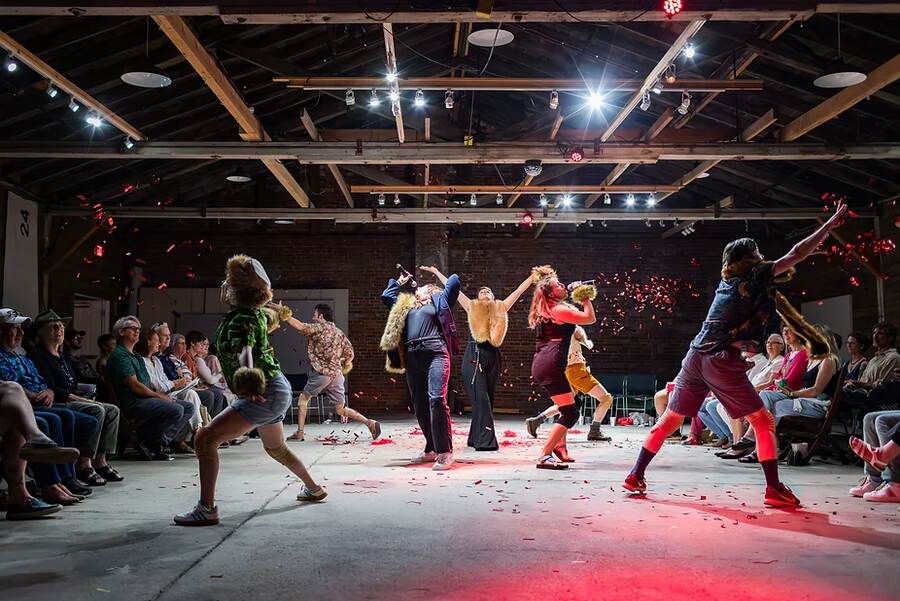For a moment, it felt like the 2024 January festival season might not happen at all. In June, it was announced that the Public Theater was putting the Under the Radar (UTR) festival on “hiatus.” As the largest in scale, UTR is often seen as the centerpiece of New York’s annual January festival season (which coincides with the Association of Performing Arts Professionals presenters conference), with the Public as its hub.
But UTR, and its artistic director Mark Russell, snatched victory from the jaws of defeat and made the festival happen in a decentralized way with the help of several arts organizations around town offering partnerships with UTR. Meanwhile, Prototype and the Exponential Festival were already set to present opera and underground work, respectively. So it is with great relief that I can report: There was a festival season to talk about this year, even if this ecosystem seems more precarious every year. (COIL and American Realness are still missed.)
With shows all over town, I raced from Queens to Manhattan to Brooklyn to see 11 shows in person. When the January weather gets bad, I often think, “My kingdom for a venue closer to my living room!” This year Prototype and Exponential did one better: They offered online show options, so that I was able to take in six additional shows in my living room.
In 2024, I experienced audience interaction from the gentle to the abrasive, viewed works in multiple languages, and got a window into lives I have never seen onstage before. These are the reasons these festivals exist. Let’s hope they live to see another year.
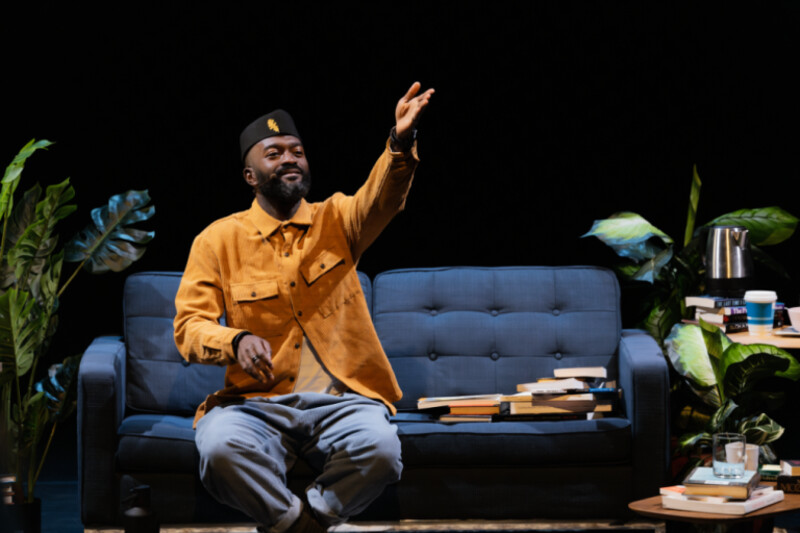
Stories of immigration and identity are not uncommon. But I was surprised how much I enjoyed Inua Ellams’s casual, suggestion-based show, Search Party (UTR). Ellams pulled out his iPad with all his writing in it, and, based on suggested words from the audience (the night I attended, the words were explosions, rice, train, investigation), would search and read something he’d written based on the prompt.
When I saw the show, he read from a poem documenting 2020, a story set in a Nigerian college school, and an essay on Tupac Shakur. He gave a little background for each piece, and it allowed him to play both charming raconteur as well as performance poet. But it was his Q&A with the audience (which is part of the show) that hit me hardest.
That’s because of the context of the whole evening. Ellams had already shared about his departure from Nigeria when he was 12, his time in boarding school, and racism he has experienced. He talked about a sense of dislocation from his Nigerian culture and the way in which he still lives in a state of flux. When asked during the Q&A about what he has lost as a diasporic person, he only could say, “So much.” The vastness and weight of those two words loomed over every other word he spoke that evening.
Having seen my share of shows that really pushed and challenged the audience, I did not know how much I needed John Jarboe’s show Rose: You Are Who You Eat (UTR), which joyously invited us in. Who knew a “gender cannibalism” cabaret about one person’s genderqueer journey would be the festival’s warmest offering?
Jarboe tells the story of how, when she came out to her aunt as genderqueer, her aunt informed her that John had had a twin in the womb, whom she effectively ate. The aunt suggested, “This is why you are the way you are.” Internalizing that, the question John posits throughout Rose is: Who ate whom? Did John eat this twin in the womb, or, through adulthood, did Rose consume John? Has John’s process of finding herself been aided by Rose’s intercession on some level?
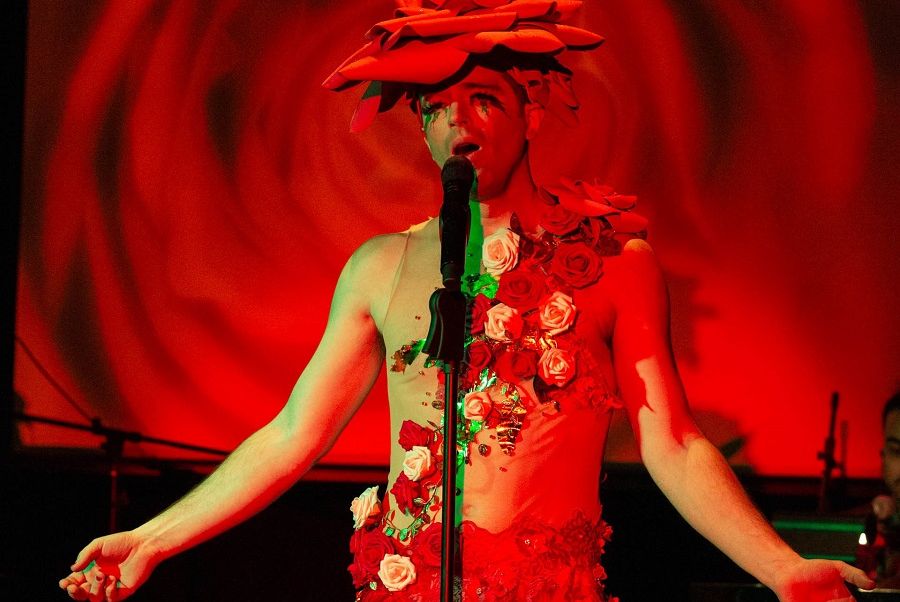
On a floral altar, back by a sizzling band, Jarboe wears a ball gown made of hockey jerseys, silver sequined boots, and a hockey helmet with embroidered roses—“Sasha Velour meets the Mighty Ducks,” as she describes her look. As she leads us through her family photos and childhood memories, she addresses her relentless Catholic guilt, a pull toward the “deviant,” a love of performance, and even a generalized confusion over the goings-on in hockey locker rooms. (There’s a lot of hockey goings-on in Michigan.)
With musical compositions by Jarboe, Emily Bate, Daniel de Jesus, Pax Ressler, and Be Steadwell, this enveloping cabaret also includes a fair amount of audience participation, lightly asked for and enthusiastically given at the performance I attended, which fosters a sense of togetherness even on a unique personal journey.
Other shows at the festival were meant to be more directly challenging. The history of Chinese immigration to America is a road paved with cruelty, abhorrent stereotypes, and exclusion. In Angel Island (Prototype), an opera by composer Huong Ruo, this lamentable history is set to music and dance, using the language of the people who were incarcerated in that infamous immigration station in San Francisco as the libretto.
Massive film projections (by Bill Morrison) of the ocean, historic texts, and barbed wire set the scale for the devastation, as the piece recounts a mass lynching incident, addresses the impact of the Page Act of 1875 (which limited Chinese women immigrating on the spurious grounds that they might be sex workers), and repeats some of the vitriolic, anti-immigration rhetoric from the era. There is even a story related to the Titanic: Chinese survivors were denied healthcare when they landed in America, possibly the most American of acts, and were then deported immediately.
The music, with the tone of a tragic requiem, is the solemn backdrop to the voiceover storytelling. Angel Island is not an easy show to hold but a necessary one.
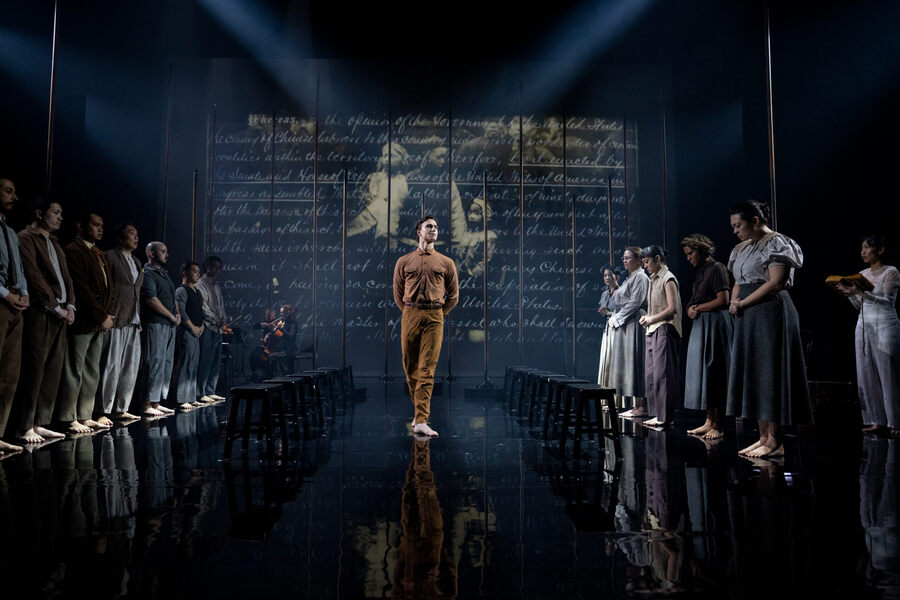
Sometimes you do not know what kind of show you are going to get. With Cliff Cardinal’s show, William Shakespeare’s As You Like It, A Radical Retelling By Cliff Cardinal (UTR), that is the whole idea. This “radical retelling” is not what it seems at all. Cardinal plays with audience expectations for very specific reasons: As an Indigenous artist who has seen more than his share of performative activism in theatres (i.e., perfunctory land acknowledgements), he is looking to reframe the issue of Indigenous rights and the injustices committed against them for audiences who may not even know these problems exist.
The show is designed to create friction with the audience, but I’m not sure even Cardinal was prepared for the level of audience rage he elicited on the afternoon I saw it. A woman screaming at him that he was being racist against white people only helped to prove his point, though the moment only ended when Cardinal told this relentless heckler to “fuck off” as she stormed out. Sadly, she was not the only one: Several audience members thought they were entitled to disrupt the show and verbally object to Cardinal’s work, including questioning the history he recounts.
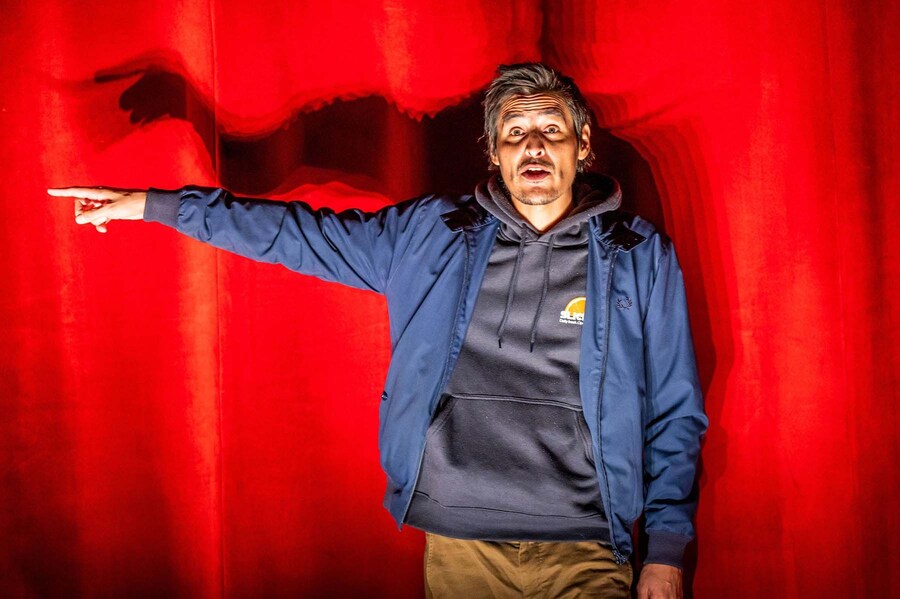
Part of Cardinal’s “trick” is a kind of bait and switch, designed to get people into the theatre who need to hear his message, not just those who are primed for it. But even he seemed thrown off his game that afternoon; there were moments I struggled to follow his loose, contradictory, standup-style delivery. While standup comics often create and break tension with audiences, at the performance I saw, the artist created discord, then lost control of the audience. Frustratingly, the fracture is what I will remember most.
Not all shows were that intense. Roar! (Exponential) is a play with songs based on the making of the 1981 film Roar, a box-office (and actual) disaster. The film was the creation of Tippi Hedren and her second husband Noel Marshall, who dragged their kids into the making of it, alongside the many lions and other wild animals they had been raising in their home. Not surprisingly, people got injured (a lot). The crew walked off the project (many times). Several people got gangrene from animal bites.
The musicalized version of this story, written and directed by Lindsey Hope Pearlman, focuses on the triumvirate of women in the family: Hedren, her daughter Melanie Griffith, and Melanie’s daughter, Dakota Johnson. Each had their own history of traumatic film experiences as women in the film business: Alfred Hitchcock’s predations, being mauled by a lion, acting in 50 Shades of Grey, respectively.
This scrappy production employs creative flourishes to suggest wild animals (actors wearing dollops of fur) and gore (red confetti and an exquisite red sequin skull cap). It has unexpected moments of thoughtful introspection, with Katie Hartman delivering Griffith’s breathless teenage ponderings with straight-faced sincerity. Lyndsey Anderson excels as over-the-top cinematographer Jan de Bont, who takes a licking from a lion and keeps on ticking. The lamentation song by Marshall’s teenage sons, “All We Wanted Was Dirt Bikes,” is a particular stand-out. The show drags a bit, but there is something intriguing at its core.
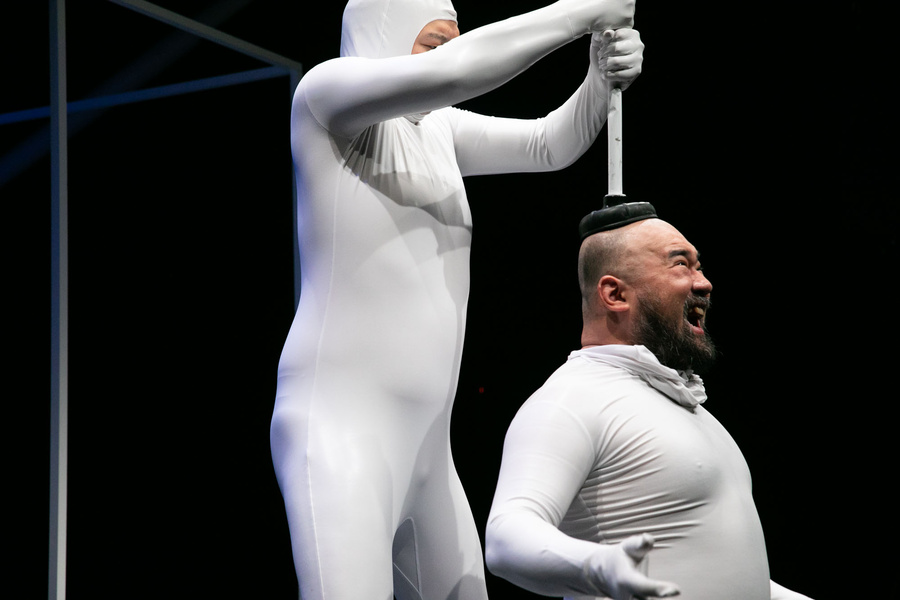
A very different kind of human suffering was expressed in Hamlet | Toilet (UTR), by Japanese theatre company Kaimaku Pennant Race. Starting with a fart rap (“To <fart sound> or not to <fart sound>”), this show did not seem at first like a show for me. A previous show by Kaimaku was a mash-up of boxing manga and Macbeth (Rocky Macbeth). Here, though, the absurdist marriage of poop and Shakespeare unexpectedly made a lot of dramaturgical sense.
The central concept is that the Prince’s painful constipation parallels Hamlet’s inability to act. “It’s a movement that has yet to move,” as he puts it. More surprising is that Hamlet is stopped up by the ghost of his dad in poop form. (Let’s not get deep into the bowels of how the late king was poisoned from the bottom up.)
With an 85-minute running-time, it manages to tick off the boxes of the Hamlet narrative, using unusual visual metaphors along the way: Claudius’s confession takes place under a hail of rocks from the heavens; Ophelia is drowned in the sewers. Beyond the fart jokes and butt humor, the playfulness of the language (performed in Japanese but translated with supertitles) had me in stitches, as when a character is described as “a Dad bod like a rubber ball,” and the actor in his shiny white body suit fit the bill exactly.
The online festival offerings came in many forms, including pre-recorded works, works-in-progress, and livestreams.
I ended up seeing DIRT (Exponential) on its live-stream while it was being simultaneously performed for a live audience. For this interactive game show about voting, undue influence, politics, land use, and climate change by company Sour Milk, audience members were given character profiles and were invited to run for mayor of New York (online participants could also create a character and vote).
In-person audience members made their campaign pleas before the crowd. Their task was to figure out how to use the “new land” that emerged when the East River disappeared and became dirt. The audience then voted, and the cast set about to execute those plans. Filming a large box of “dirt” from above, we watched as apple slices became residential space, cookies turned into commercial zoning, and vegetables represented manufacturing. Public housing was erected with graham crackers. Streetlights were cheese balls on toothpicks. Despite this whimsical landscape, the show asks some big questions about the city and the decisions that make it what it is, for better and worse.
On the other end of the spectrum, Prototype’s online shows were pre-filmed opera works which demonstrated the far reaches of the form. Swann is described as a “digital aria.” A short film with music by composer Tamar-Kali with a libretto by Carl Hancock Rux, it uses language around the arrest of William Dorsey Swann, known as the first drag queen, against the celebratory language of the Swann character himself, capturing a glimpse of queer Black history.
Whiteness (also Prototype), with music and text by Paul Pinto and video design and direction by Kameron Neal, is referred to as a “music video.” It is defined by its visual playfulness. Pinto performs it with repeating images, floating heads, and textual juxtapositions to discuss race and whiteness with a wicked sense of humor.
Both in person and online, January was a month of theatrical surprises—though perhaps nothing was more pleasantly surprising than the persistence for one more season of this annual winter tradition.
Nicole Serratore (she/her) is a New York City-based attorney and theatre critic. She writes for publications such as The Stage, Variety, Time Out New York, BAMbill and Exeunt NYC.

